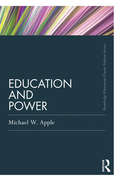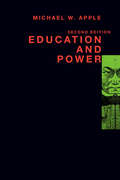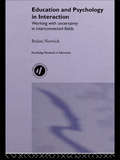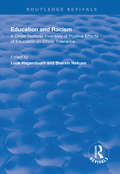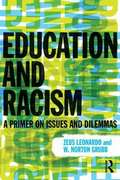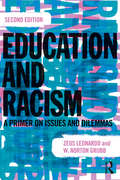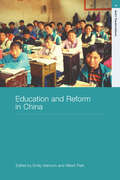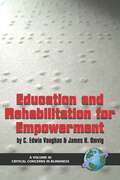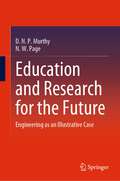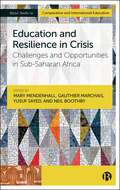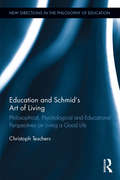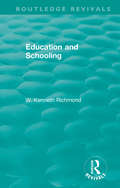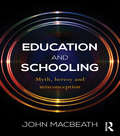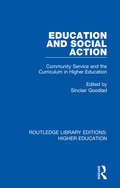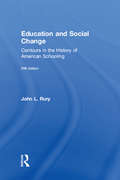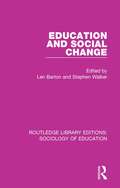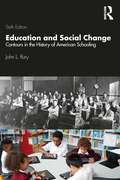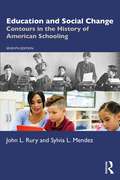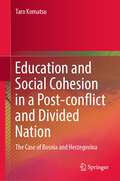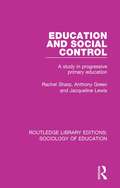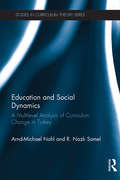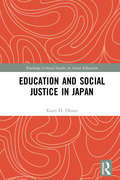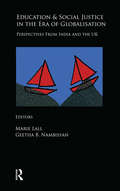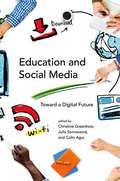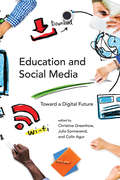- Table View
- List View
Education and Power
by Michael W. AppleFirst published in 1982, Education and Power remains an important volume for those committed to critical education. In this text Michael Apple first articulated his theory on educational institutions and the reproduction of and resistance to unequal power relations, and provided a thorough examination of the ways in which race-gender-class dynamics are embedded in, and reflected through, curricular issues. While many of the theories set forward in this book are now taken for granted by the left in education, they were nothing short of revolutionary when first proposed. In this newly reissued classic edition, Apple suggests that we need to take seriously the complicated and contradictory economic, political and cultural structures that provide for some of the most important limits on, and possibilities for, critical education. He re-examines his earlier arguments and reflects on what has happened over the intervening years. Education and Power is a vital example of the call to challenge the assumptions that underpin so much of what happens in education.
Education and Power
by Michael W. AppleIn his seminal volume first published in 1982 Michael Apple articulates his theory on educational institutions and the reproduction of unequal power relations and provides a thorough examination of the ways in which race-gender-class dynamics are embedded in, and reflected through, curricular issues. This second edition contains a re-examination of earlier arguments as well as reflections on recent changes in education.
Education and Psychology in Interaction: Working With Uncertainty in Interconnected Fields (Routledge Research in Education)
by Brahm NorwichThis book takes an in-depth look at how education and psychology relate to each other, and at the current state of this relationship. Through comprehensive analysis of the ideological, historical, social and professional contexts of this interaction, the author develops the theme that, despite basic differences in aims, the fields are interconnected.
Education and Racism: A Cross National Inventory of Positive Effects of Education on Ethnic Tolerance (Routledge Revivals)
by Louk Hagendoorn Shervin NekueeFirst published in 1999, this book gives an inventory of factors contributing to ethnic prejudice in seven countries and the role of formal education among them on the basis of national surveys. It appears that education is crucial in all the countries surveyed and contributes to more tolerant views of ethnic and national minorities in Western European countries, Poland and the United States. The positive effects of education, however, do not always counter the negative effects of personality characteristics and conservative values on ethnic prejudice. Moreover, the negative effects of less formal education may be reinforced by perceived economical competition of ethnic minorities and thereby further bolster prejudiced views of the less educated. This indicates that formal education alone is not sufficient to change prejudiced views. Other forms of socialization transmitting values leading to open-mindedness and the ability to secure one's economic position have to support the positive effects of formal education as well.
Education and Racism: A Primer on Issues and Dilemmas
by W. Norton Grubb Zeus LeonardoEducation and Racism is a concise and easily accessible primer for introducing undergraduate and graduate students to the field of race and education. Designed for introductory courses, each chapter provides an overview of a main issue or dilemma in the research on racial inequality and education and the particular approaches that have been offered to explain or address them. Theme-oriented chapters include curriculum, school (re)segregation, and high stakes testing as well as discussions on how racism intersects with other forms of marginality, like socio-economic status. The focus on particular educational themes is the strength of this book as it paints a portrait of the systematic nature of racism. It surveys multiple approaches to racism and education and places them in conversation with one another, incorporating both classical as well as contemporary theories. Although conceptually rich and dense with critical perspectives and empirical study, the book uses clear and transparent language throughout for easy comprehension. Perfect for courses in Multicultural Education, Sociology of Education, Ethnic Studies and more, Education and Racism is the ideal primer for engaging students new to race and education without sacrificing the content for those who are already familiar with the field.
Education and Racism: A Primer on Issues and Dilemmas
by W. Norton Grubb Zeus LeonardoEducation and Racism is a concise and easily accessible primer for introducing undergraduate and graduate students to the field of race and education. Designed for introductory courses, each chapter provides an overview of a main issue or dilemma in the research on racial inequality and education and the particular approaches that have been offered to explain or address them. Theme-oriented chapters include curriculum, school (re)segregation, and high stakes testing as well as discussions on how racism intersects with other forms of marginality, like socio-economic status. The focus on particular educational themes is the strength of this book as it paints a portrait of the systematic nature of racism. It surveys multiple approaches to racism and education and places them in conversation with one another, incorporating both classical as well as contemporary theories. Although conceptually rich and dense with critical perspectives and empirical study, this expanded edition contains several powerful vignettes that illustrate the commanding roles racism and structural inequality continue to play in the classroom. Perfect for courses in Multicultural Education, Sociology of Education, Ethnic Studies and more, Education and Racism is the ideal primer for engaging students new to race and education without sacrificing the content for those who are already familiar with the field.
Education and Reform in China (Routledge Studies in Asia's Transformations)
by Emily Hannum Albert ParkTransformative market reforms in China since the late 1970s have improved living standards dramatically, but have also led to unprecedented economic inequality. During this period, China’s educational system was restructured to support economic development, with educational reforms occurring at a startling pace. Today, the educational system has diversified in structure, finance, and content; it has become more market-oriented; and it is serving an increasingly diverse student population. These changes carry significant consequences for China’s social mobility and inequality, and future economic prospects. In Education and Reform in China, leading scholars in the fields of education, sociology, demography, and economics investigate the evolution of educational access and attainment, educational quality, and the economic consequences of being educated. Education and Reform in China shows that economic advancement is increasingly tied to education in China, even as educational services are increasingly marketized. The volume investigates the varying impact of change for different social, ethnic, economic and geographic groups. Offering interdisciplinary views on the changing role of education in Chinese society, and on China’s educational achievements and policy challenges, this book will be an important resource for those interested in education, public policy, and development issues in China.
Education and Rehabilitation for Empowerment
by James H. Omvig C. Edwin VaughanThis work is an examination of educational issues and policies impacting on the blind. Topics include Braille literacy, the teaching of orientation and mobility, adult rehabilitation programmes and policies, and the role of state and federal government in the education and rehabilitation process.
Education and Research for the Future: Engineering as an Illustrative Case
by D. N. Murthy N. W. PageThis book takes a fresh look at the fundamental character of education, its history, interaction with society, purpose, changing focus over time and interactions with technology. It surveys the role of research in increasing the body of knowledge leading to new technologies that have helped serve the needs of humankind.In our lifetime there have been profound changes to the world we live in; the technologies used, the problems we struggle with, and the education systems intended to prepare this and following generations for the future. Many of the problems we face now are more complex than in earlier times, requiring broadly based approaches our traditional silo specialisations are ill-prepared to deal with. They involve technologies whose range of positive and negative effects are not well understood. Many of these problems are global in nature and can no longer be treated just as local issues. Our current approach to education does not adequately prepare us to tackle these problems.New approaches to education are needed to prepare us for the changes that are to come. The future of our planet, our civilisation, our community and our economy depend on it. This book proposes changes that will better prepare us for this future.
Education and Resilience in Crisis: Challenges and Opportunities in Sub-Saharan Africa (Bristol Studies in Comparative and International Education)
by Sweta Gupta Danielle Falk Daniel Shephard Cyril Brandt Dieudonné Kanyerhera Diego De la Fuente Stevens Samuel Matabishi Abby Mills Ygal Sharon Shukrani Salvatory Ashika Sharma Abdi Bihi Hanaf Muktar Hersi Mohamed Bang Chuol Aditi DesaiThis book provides an important lens for understanding how interlocking humanitarian crises caused by armed conflict, natural disasters, forced displacement and, more recently, a global health pandemic have adversely impacted teaching and learning. It brings together evidence from multiple, diverse research-practice partnerships in seven countries: the Democratic Republic of the Congo, Ethiopia, Niger, Somalia, South Sudan, Tanzania and Uganda. The authors provide a clear account of the key academic, policy and practice questions on education in crisis contexts and consider our capacity to develop just and resilient education systems.
Education and Schmid's Art of Living: Philosophical, Psychological and Educational Perspectives on Living a Good Life (New Directions in the Philosophy of Education)
by Christoph TeschersInstead of simply following the current neoliberal mantra of proclaiming economic growth as the single most important factor for maintaining well-being, Education and Schmid’s Art of Living revisits the idea of an education focused on personal development and the well-being of human beings. Drawing on philosophical ideas concerning the good life and recent research in positive psychology, Teschers argues in favour of shifting the focus in education and schooling towards a beautiful life and an art of living for today's students. Containing a thorough discussion of the ideas of contemporary German philosopher Wilhelm Schmid, this book considers the possible implications of developing a more humanistic and life-centred approach to educational policy, research and practice, showing that Schmid’s concept of Lebenskunst provides a firm philosophical basis for this endeavour. Among others, this book draws on analytical and continental traditions to challenge current views and assumptions in regard to education and the role of schooling for contemporary societies. As a result, Teschers’ work is sure to spark a debate about the direction of educational policy and practice in the 21st century. Education and Schmid’s Art of Living is essential reading for academics and students with an interest in education. Given the importance of such topics as the relationship between education and society, teacher education and how best to structure schools and learning environments, Teschers’ work will appeal to academics and students in a diverse range of fields, including education, philosophy, sociology and psychology.
Education and Schooling (Routledge Revivals)
by W. Kenneth RichmondIn the early 1970s the crisis in schools, particularly in urban areas, had escalated. At the same time a number of writers had advocated either the abolition or the recasting of the school system as a whole. The late Kenneth Richmond saw these phenomena as symptoms of a struggle towards a much-needed new theory and practice of education. Increasingly, he felt, it is realised that a schooled society is not synonymous with an educative society, and that learning which stops at the age of sixteen and which makes the learner the submissive receiver of instruction and training is simply inadequate in an age of technology. The ’generative theory’ of education outlined in this book, originally published in 1975, would conceive of the learner as the controlling agent in a network of educational resources, and of education as a lifelong process. Learning can no longer be confined within the frames and classifications imposed upon it by traditional pedagogy. Recent research evidence indicates that the importance attached to formal schooling is greatly exaggerated and that the financial and other resources devoted to the expansion of so-called educational services are largely wasted. There is a need, the author stresses, for a much wider definition of education – one that would recognise the validity of the numerous skills acquired outside the classroom (at home, in the peer group, at the work-place) and would deliberately foster a ‘school without walls’ policy, whereby community institutions and organizations could be used as learning environments. Only by taking steps in this direction, he believes, can we overcome the apparently intractable problems of the schools today.
Education and Schooling: Myth, heresy and misconception (School Education Reform Ser.)
by John MacBeathThe French have a sayingplus ca change plus c�est la meme chose. The English colloquial equivalent ‘same old same old conveys a sense of the inevitable, a reminder that if we haven‘t learned the lessons of history we are doomed to repeat them. In over half a century, what have we learned about education, about schools as places for education, a
Education and Social Action: Community Service and the Curriculum in Higher Education (Routledge Library Editions: Higher Education #10)
by Sinclair GoodladOriginally published in 1975 Education and Social Action, examines the possibility and value of effecting links between community service and the curriculum in various sectors of higher education. It describes what has been done in each of several disciplines in giving students the opportunity to carry out work of direct social utility within the context of the curriculum. It examines the benefits and the problems experienced by students, their teachers, and analyses the social and educational issues involved. The book derives links between the work of Community Service Volunteer in fostering links between Community Service and the curriculum, not only in schools but in institutions of higher education.
Education and Social Change
by John L. RuryThis brief, interpretive history of American schooling focuses on the evolving relationship between education and social change. Like its predecessors, this new edition investigates the impact of social forces such as industrialization, urbanization, immigration and cultural conflict on the development of schools and other educational institutions. It also examines the various ways that schools have contributed to social change, particularly in enhancing the status and accomplishments of certain social groups and not others. Detailed accounts of the experiences of women and minority groups in American history consider how their lives have been affected by education. Changes in this new edition include the following: A more thorough treatment of key concepts such as globalization, human capital, social capital, and cultural capital. Enhanced attention to issues of diversity throughout. Greater thematic coherence as a result of dividing chapter 6 into two chapters, the first focusing on the postwar period and emphasizing the themes of equity and social justice and the second focusing on human capital in education, highlighting the standards movement, federal policy changes and neo-liberal reform. A revision of several focal point discussions for greater clarity and thematic releance. Update discussions of recent changes in educational politics, finance and policy, especially the troubles presently facing No Child Left Behind (NCLB).
Education and Social Change (Routledge Library Editions: Sociology of Education #4)
by Stephen Walker Len BartonThis book, first published in 1985, argues that changes in the education system are closely bound up with wider social and political changes. It considers items within education such as developments in teacher assessment policy and changes in the control of education policy; and external items such as new directions in the management of the economy, of class relations and of the political system. Throughout, the book reflects a mood of growing frustration and anxiety shared by many teachers and educationalists which, the book argues, stems from a feeling that the education system is not being run as it should be. This title will be of interest to students of education and sociology.
Education and Social Change: Contours in the History of American Schooling
by John L. RuryThis brief, interpretive history of American schooling focuses on the evolving relationship between education and social change. Like its predecessors, this new edition investigates the impact of social forces such as industrialization, urbanization, immigration, and cultural conflict on the development of schools and other educational institutions. It also examines the various ways that schools have contributed to social change, particularly in enhancing the status and accomplishments of certain social groups and not others. Detailed accounts of the experiences of women and minority groups in American history consider how their lives have been affected by education at key points in the past. Updates to this edition A revised final chapter updated to include recent changes in educational politics, finance, policy, and a shifting federal policy context Enhanced coverage and new conceptual frames for understanding the experiences of women and people of color in the midst of social change Edited throughout to update information and sources regarding the history of American education and related processes of social transformation in the nation’s past
Education and Social Change: Contours in the History of American Schooling
by John L. Rury Sylvia L. MendezThis concise, interpretive history of American schooling focuses on the evolving relationship between education and social change.Like its predecessors, this fully updated new edition investigates the impact of social forces such as industrialization, urbanization, immigration, globalization, and cultural conflict on the development of schools and other educational institutions. It also examines the various ways that schools have contributed to social change, particularly in enhancing the status and accomplishments of certain social groups and not others. Detailed accounts of the experiences of women and minority groups in American history consider how their lives have been affected by education at key points in the past.Updates to the seventh edition include: Enhanced coverage for understanding the experiences of Native Americans, students in poverty settings, and the LGBTQ+ community in the midst of social change. New topics include settler colonialism, indigeneity, culturally diverse education, gay and transgender educational policies, charter schools, voucher programs, and the rise of testing in schools. It has been edited throughout to update information and sources regarding the history of American education and related processes of social transformation in the nation’s past.This bestselling introductory text is essential reading for Educational Foundations, History of Education, and Schools and Society, and similar courses for pre-service teachers, educational leaders, and others.New online material includes discussion questions and links to further reading and resources, available at www.routledge.com/9781032745947
Education and Social Cohesion in a Post-conflict and Divided Nation: The Case of Bosnia and Herzegovina
by Taro KomatsuThis book discusses education’s role of developing social cohesion in a post-conflict environment where tensions continue to exist between the three “constituent” ethnic groups. It offers fresh insights into the relationship between education and social cohesion in a specific context of Bosnia & Herzegovina, where the need to rebuild social trust is acutely felt. This book first elaborates the concept of social cohesion and illustrates possible mechanisms through which education can develop, or further erode, social cohesion in already divided societies. Then, it carefully examines such mechanisms, using a case study of a Bosnia & Herzegovina which witnessed violent conflict instigated by ethno-identity politics during 1992-1995, and has been struggling to reconstruct its broken social fabric since then.
Education and Social Control: A Study in Progressive Primary Education (Routledge Library Editions: Sociology of Education #49)
by Anthony Green Rachel Sharp Jacqueline LewisFirst published in 1975, this book offers a critique of some of the ‘new perspectives’ in the sociology of education. This is achieved through a case study of a progressive child centred school. The book suggests that a liberal approach to education fails to appreciate how thoroughly a complex, stratified industrial society penetrates the school. It argues that the practice of ‘progressive’ education may be a modern form of conservativism and an effective form of social control both in the narrow sense of achieving classroom discipline and in the wider sense of contributing to the promotion of a static social order. It cautions against naïve utopian solutions which see the freedom and self-development of the child as an individualized process, unrelated to a social context which may undermine the ideals of freedom and spontaneous self-development. In addition to offering a study of the implementation of the ‘open’ approach to child development and pedagogy, the book can also be read as a piece of critical sociology, intended to make the reader look again at the way in which problems have been generated and solutions proposed within sociology and education.
Education and Social Dynamics: A Multilevel Analysis of Curriculum Change in Turkey (Studies in Curriculum Theory Series)
by Arnd-Michael Nohl R. Nazlı SomelEducation and Social Dynamics offers a new approach to analyzing curriculum change by investigating the entanglement of education and society in markedly heterogeneous Turkey, which has recently witnessed nation-wide curriculum reforms. While the new curriculum has attempted to homogenize all Turkish primary schools since 2005, Nohl and Somel, drawing on a theoretical differentiation of social entities, reveal how subsequent curricular practices have had to account for the diversity of milieus and organizations in the nation’s educational sector, and how inequality and competition run rampant in the standardization efforts. Using expert interviews, group discussions, and other empirical data that compare instructional practices within five distinct schools, the book represents a breakthrough in our understanding of developments in Turkey and their significance for extant theories of curriculum development and reform worldwide. By linking specific case study material from Turkey to intensifying international concerns, it provides an important and relevant global commentary.
Education and Social Justice in Japan (Routledge Critical Studies in Asian Education)
by Kaori H. OkanoThis book is an up-to-date critical examination of schooling in Japan by an expert in this field. It focuses on developments in the last two decades, with a particular interest in social justice. Japan has experienced slow economic growth, changed employment practices, population decline, an aging society, and an increasingly multi-ethnic population resulting from migration. It has faced a call to respond to the rhetoric of globalization and to concerns in childhood poverty in the perceived affluence. In education we have seen developments responding to these challenges in national and local educational policies, as well as in school-level practices. What are the most significant developments in schooling of the last two decades? Why have these developments emerged, and how will they affect youth and society as a whole? How can we best interpret social justice implications of these developments in terms of both distributive justice and the politics of difference? To what extent have the shifts advanced the interests of disadvantaged groups? This book shows that, compared to three decades ago, the system of education increasingly acknowledges the need to address student diversity of all kinds, and delivers options that are more varied and flexible. But interest in social justice in education has tended to centre on the distribution of education (who gets how much of schooling), with fewer questions raised about the content of schooling that continues to advantage the already advantaged. Written in a highly accessible style, and aimed at scholars and students in the fields of comparative education, sociology of education and Japanese studies, this book illuminates changing policies and cumulative adjustments in the daily practice of schooling, as well as how various groups in society make sense of these changes.
Education and Social Justice in the Era of Globalisation: Perspectives from India and the UK
by Marie Lall; Geetha B. NambissanThe book discusses the implications of globalization on education from the perspective of social justice. It looks at two countries — India and the UK — to look at how global economic and cultural processes are mediated through nation states, institutional structures and the aspirations of different social groups. It seeks to resituate the debates around education and social justice in policy, research and public discourse by highlighting the need for a more nuanced understanding of globalization and education. It also demonstrates the effects of economic dimensions — the politics of neoliberalism, and how this has shifted the understanding of state responsibilities and marginalized issues pertaining to the agenda of social justice.
Education and Social Media: Toward a Digital Future
by Colin Agur Christine Greenhow Julia SonnevendHow are widely popular social media such as Facebook, Twitter, and Instagram transforming how teachers teach, how kids learn, and the very foundations of education? What controversies surround the integration of social media in students' lives? The past decade has brought increased access to new media, and with this new opportunities and challenges for education. In this book, leading scholars from education, law, communications, sociology, and cultural studies explore the digital transformation now taking place in a variety of educational contexts. The contributors examine such topics as social media usage in schools, online youth communities, and distance learning in developing countries; the disruption of existing educational models of how knowledge is created and shared; privacy; accreditation; and the tension between the new ease of sharing and copyright laws. Case studies examine teaching media in K--12 schools and at universities; tuition-free, open education powered by social media, as practiced by the University of the People; new financial models for higher education; the benefits and challenges of MOOCS (Massive Open Online Courses); social media and teacher education; and the civic and individual advantages of teens' participatory play.ContributorsColin Agur, Jack M. Balkin, Valerie Belair-Gagnon, danah boyd, Nicholas Bramble, David Buckingham, Chris Dede, Benjamin Gleason, Christine Greenhow, Daniel J. H. Greenwood, Jiahang Li, Yite John Lu, Minhtuyen Mai, John Palfrey, Ri Pierce-Grove, Adam Poppe, Shai Reshef, Julia Sonnevend, Mark Warschauer
Education and Social Media: Toward a Digital Future (The John D. and Catherine T. MacArthur Foundation Series on Digital Media and Learning)
by Colin Agur Christine Greenhow Julia SonnevendLeading scholars from a variety of disciplines explore the future of education, including social media usage, new norms of knowledge, privacy, copyright, and MOOCs.How are widely popular social media such as Facebook, Twitter, and Instagram transforming how teachers teach, how kids learn, and the very foundations of education? What controversies surround the integration of social media in students' lives? The past decade has brought increased access to new media, and with this new opportunities and challenges for education. In this book, leading scholars from education, law, communications, sociology, and cultural studies explore the digital transformation now taking place in a variety of educational contexts. The contributors examine such topics as social media usage in schools, online youth communities, and distance learning in developing countries; the disruption of existing educational models of how knowledge is created and shared; privacy; accreditation; and the tension between the new ease of sharing and copyright laws. Case studies examine teaching media in K–12 schools and at universities; tuition-free, open education powered by social media, as practiced by the University of the People; new financial models for higher education; the benefits and challenges of MOOCS (Massive Open Online Courses); social media and teacher education; and the civic and individual advantages of teens' participatory play.ContributorsColin Agur, Jack M. Balkin, Valerie Belair-Gagnon, danah boyd, Nicholas Bramble, David Buckingham, Chris Dede, Benjamin Gleason, Christine Greenhow, Daniel J. H. Greenwood, Jiahang Li, Yite John Lu, Minhtuyen Mai, John Palfrey, Ri Pierce-Grove, Adam Poppe, Shai Reshef, Julia Sonnevend, Mark Warschauer
